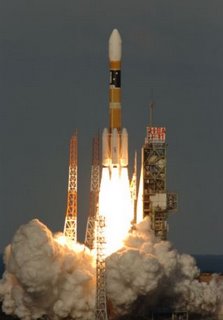1.25.2007
Meanwhile, over in Japan
 While China grabbed the world's attention with its ASAT weapon display this month, over in neighboring Japan lawmakers are contemplating their own nation's future in space. An editorial in The Daily Yomiuri, (Jan. 21, 2007) which notes Japan's space development program "is barely holding together and lacks any real substance," calls on Japan's Liberal Democratic Party (LDP) to act on establishing a bill of "Basic Space Law" that would "get Japan in space race."
While China grabbed the world's attention with its ASAT weapon display this month, over in neighboring Japan lawmakers are contemplating their own nation's future in space. An editorial in The Daily Yomiuri, (Jan. 21, 2007) which notes Japan's space development program "is barely holding together and lacks any real substance," calls on Japan's Liberal Democratic Party (LDP) to act on establishing a bill of "Basic Space Law" that would "get Japan in space race."I have not seen a draft, but Keiji Tachikawa, President of the Japan Aerospace Exploration Agency (JAXA) (宇宙航空研究開発機構) said in his 2007 new year interview, "House members finally formulated basic space legislation last year, creating the climate for the development of the nation's space policy. The space bill will reportedly be submitted soon to the Diet, and I hope that this will clarify space policy at the governmental level, which will also facilitate the operation of JAXA as an executive agency. I do hope the bill will pass."
According to the editorial, the LDP proposal includes a new governmental "Space Strategy Headquarters" to "promote comprehensive space-related policies." The party's proposal is based on "three main pillars":
--Reinforcing the nation's security through the development and utilization of space.Pointing out that Japan is "trailing internationally," and "still struggling in its development of its space program," and citing difficulties with nation's H2-A booster in the satellite launching business among other concerns, the paper concludes:
--Promoting space-related research and development.
--Promoting the development of the space industry.
Only a handful of launch projects attract global attention. With very few practical-use satellites being ordered and government research and development projects being the only source of such income for corporations, it may be difficult to even maintain the current technology. Countries such as China and India have gotten serious about their development programs and use of space. If we sit on our hands, we may find Japan has become an undeveloped country in the realm of space.What's been holding back Japan? In 1969, just after the U.S. landed Neil Armstrong on the moon, the 61st session of the National Diet (Japan's parliament) established the National Space Development Agency of Japan, creating a national space agency -- NASDA, predecessor of Japan Aerospace Exploration Agency (JAXA) -- and barring Japan from participation in space activities other than "exclusively for peaceful purposes." Presumably, new legislation would amend or supersede the 1969 resolution.
The editorial does specify the LDP would include in its proposed bill the phrase, "in keeping with clauses stipulated in the Outer Space Treaty."
As JAXA chief has said, "we must always remember that JAXA is an exploration agency. Research and development are our primary function."
(By way of background, on October 1, 2003, the "Institute of Space and Astronautical Science [ISAS], which was devoted to space and planetary research; the National Aerospace Laboratory of Japan [NAL], which focused on research and development of next-generation aviation; and the National Space Development Agency of Japan [NASDA], which was responsible for development of large-size launch vehicles, as represented by H-IIA, satellites, and the International Space Station" were merged into "one independent administrative institution" -- the Japan Aerospace Exploration Agency [JAXA].)
We've heard much in the past few years from those who favor revamping and upgrading Japan's approach to space business and security. Folks who think Japan should at least keep up with space-faring neighbors including China and India say change is overdue. A Space News editorial called the peaceful purposes resolution "outdated from the beginning" in that, for one thing, it was more restrictive than the Outer Space Treaty. In any case, as far as new space technology as well as national security threats, "a lot has changed" since 1969.
New law and authority (presumably including a budget to fund a more competitive national space program?) would help Japan move forward. John M. Logsdon, director of the Space Policy Institute at George Washington University's Elliott School of International Affairs, who has studied Japan's space program commented, "... I know that there is a debate in Japan now about broadening the definition of peaceful to include non-aggressive applications of space for national security. In my view, that makes sense, it is a mature approach to what space capabilities can add to the society."
Meanwhile, here is JAXA 2025, Japan's long-term vision for space announced in April 2005, which includes manned flights to the moon by 2025.
(And this is a 43-page 2005 RAND report on Japan's space program.)
At least one thing would result from new Japanese space business: more work for Japanese space lawyers.
* * *
Image: H-2A liftoff; courtesy, JAXA
* * *
UPDATE: Of course, space is not the only area in which Japan is rethinking its policies. More taboo-breaking -- the pacifist nation has apparently retired its post-WWII stance as Prime Minister Shinzo Abe this month upgraded the nation's Defense Agency to full cabinet status giving the military a new profile beyond "self-defense."






